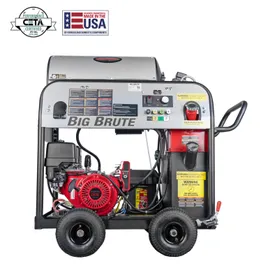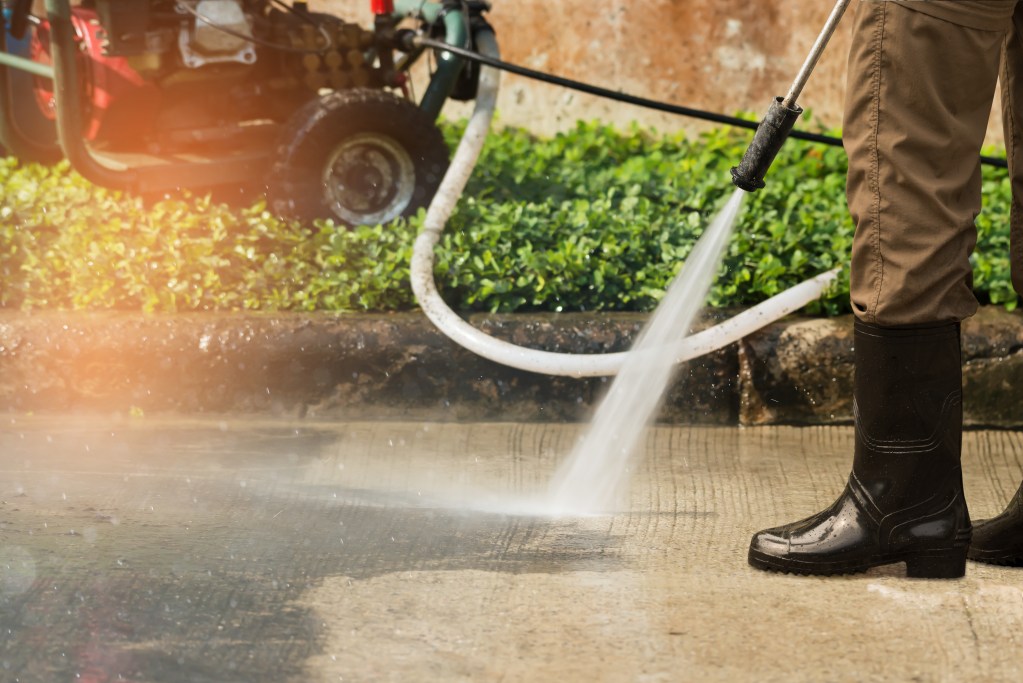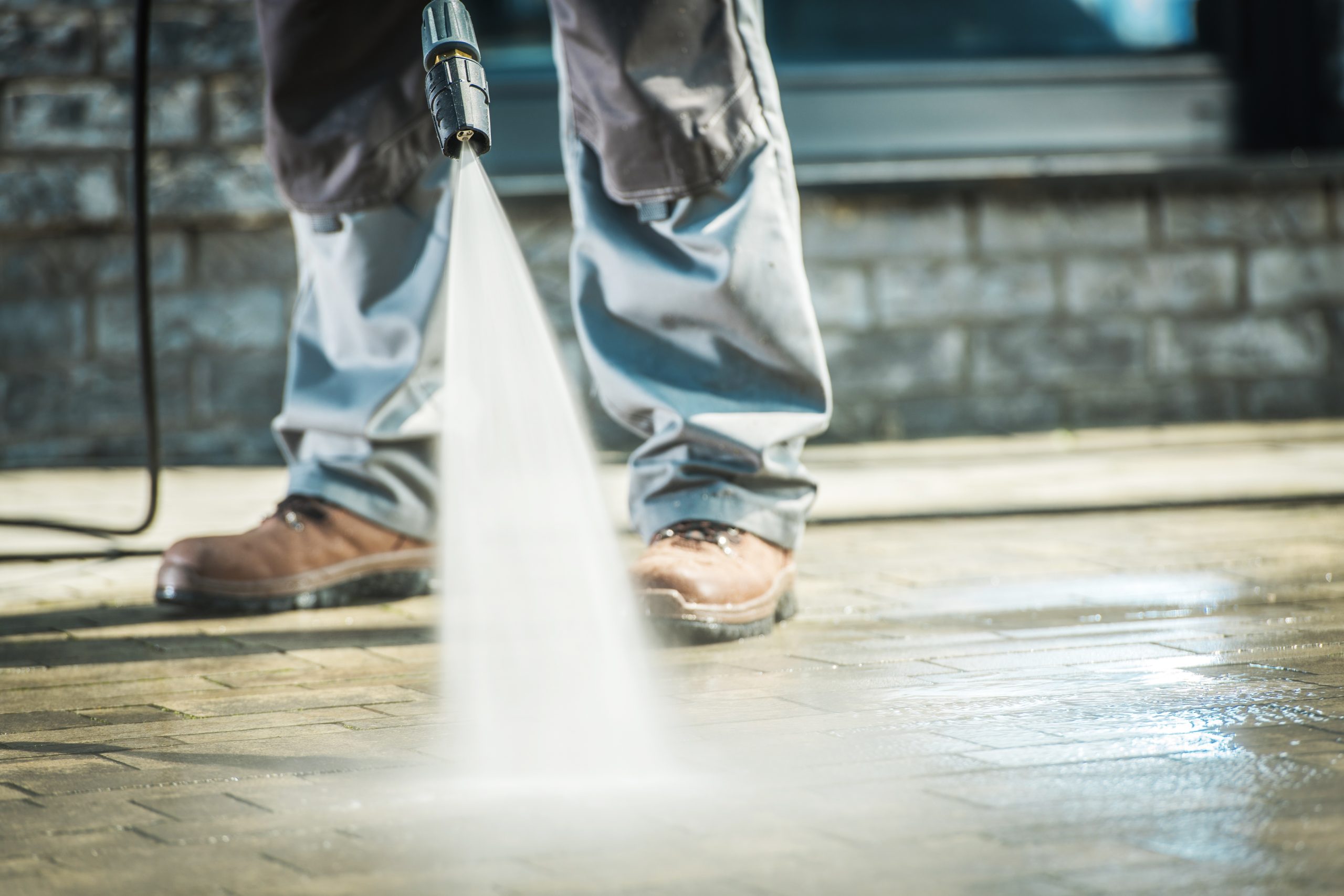Have you been looking for a way to save time and money when it comes to outdoor maintenance costs?
You’ve likely already looked into purchasing a commercial pressure washer and have noticed that they come in a wide range of prices. Depending on the features and capabilities of the pressure washer at hand, models can range from $1,500 to over $25,000.
Researching and investing in a pressure washer can be an exhaustive process. Each model you look at will come with a different array of features meant to aid in different cleaning tasks; some features may be especially useful, while others may never be needed for your facility.
That’s why it’s important to know which features you need and how that’ll affect the cost of a pressure washer so you can make sure that you don’t overpay for a piece of equipment that you and your team won’t be able to take full advantage of.
In this comprehensive guide, we’ll explore each of those factors, empowering you to make an informed purchasing decision that aligns with your budget and cleaning needs.
7 Factors that Affect the Cost of Pressure Washer
Seven key factors affect both the cost of a pressure washer and its cleaning capabilities. To make the purchasing process easy for you, our experts delve into each:
- Diesel-Fired Heating Unit
- Power Source
- Start-Up Mechanism
- Pressure Output
- Physical Size and Mobility
- Frequency of Use
- Dilution Control Systems
Let’s break each one of these down.
1. Diesel-Fired Heating Unit
One of the most important considerations that impact the price of a commercial pressure washer is whether or not you will need a machine that utilizes hot water.
All pressure washers are capable of using cold water, but some are equipped with a diesel-fired heating unit for using hot water.
Hot water allows for faster cleaning and the ability to tackle a wider range of tough contaminants with more ease. If you’re looking for increased efficiency, a hot water enabled pressure washer is the way to go.
Units capable of utilizing hot water are going to be more expensive than units that can’t. This is due to their specialized design, which enables them to handle tasks involving grease and other oily stains. The advanced technology required for hot water cleaning power and additional housing for a diesel tank contribute to a higher overall price.
2. Power Source
The power source is another critical consideration.
There are two options, electric-powered and gasoline-powered. Let’s explore the nuances of each option.
Electric-Powered Pressure Washers
Electric models, known for their affordability and convenience, are suitable for light-duty to heavy-duty applications. They offer plug-and-go convenience, making them a popular choice for situations where ease-of-use and convenience are key.
Electric-powered pressure washers can only go as far as their power cord allows. This may not be a problem for smaller facilities, but extended power cords are available for scenarios where the extra reach is needed.
Want to learn more about pressure washers? Check out our video:
Gasoline-Powered Pressure Washers
Gasoline-powered pressure washers, in contrast, provide increased robustness and mobility. These units are often favored for heavy-duty to industrial tasks and outdoor applications where an electric outlet may not be within reach.

While offering enhanced power, gasoline-powered models come at a higher pressure washer cost, reflecting their advanced capabilities and durability.
3. Start-Up Mechanism
The start-up mechanism is a fundamental aspect of pressure washer cost and design.
There are three options: electric start, pull start, and battery start. Delving into the details of each mechanism is important to ensure you make the right choice for your cleaning needs.
Electric Start
Electric-start mechanisms are found on electric pressure washers, which are generally more affordable. The mechanism itself is simple, just press a button and the machine will start. The simplicity of the electric start also means less moving parts and easier maintenance, further adding to its cost-effectiveness.
Pull Start
Gasoline models usually come equipped with a pull-start mechanism. This adds to the overall pressure washer cost due to the extra components involved. While it may be costlier, pull start provides reliability in situations where electric power might not be readily available.
Battery Starter
Battery starters are similar to the type of ignition on your car. They are found on bigger, more powerful units like truck or trailer-mounted gasoline-powered models. As such, this option will only be available on some of the more expensive commercial pressure washers. Battery starters offer a quicker, easier way to start gasoline-powered pressure washers.
4. Pressure Output
The pressure output, measured in pounds per square inch (PSI) and gallons per minute (GPM), significantly influences the cost of a pressure washer.
You can think of the pressure output as cleaning power. Light-duty pressure washers have a lower pressure output, making them suitable for light cleaning tasks, like rinsing mud from a front walk.

Meanwhile, industrial pressure washers have the highest pressure output, making them suitable for tackling grime, sludge, grease, and other oily contaminants.
The higher the PSI and GPM ratings, the more expensive the commercial pressure washer.
This is because more advanced technology and more materials are required to handle the increased pressure output. Industrial pressure washers often require large water tanks, robust housing, and a trailer for total mobility. A light-duty pressure washer, on the other hand, may not require any of these features, significantly reducing the price.
Understanding this crucial aspect helps you to avoid selecting a machine that’s more powerful and more expensive than is necessary for your cleaning requirements.
5. Physical Size and Mobility
Physical size and mobility features also contribute to the cost of a pressure washer.
While small, portable units are cost-effective and suitable for light-duty tasks, larger models, such as transport carts, truck-mounted, and trailer-mounted units, offer greater mobility and increased water tank capacity.

Water tanks come in a wide range of sizes, from 15 gallons up to 300 gallons, and can significantly impact the size and mobility of a commercial pressure washer.
However, their large size and additional features contribute to a higher pressure washer cost. Evaluating the trade-off between size, mobility, and price ensures you choose a unit that meets both your spatial constraints and cleaning needs.
6. Frequency of Use
Frequency of use is a pivotal factor in determining how much to spend on a commercial pressure washer for your facility.
If you plan on using the pressure washer for daily maintenance, it may require a model with higher durability and, therefore, a higher cost. Heavy-duty models for daily use are going to be more expensive but have better reliability and performance in the long run.
Aligning a machine’s durability with how frequently it’ll be used and the type of cleaning tasks it’ll be used for is a good measure of how much you should spend on it.
7. Dilution Control Systems
Dilution control systems, optional for many models, impact both the functionality and cost of a pressure washer.
These systems allow users to mix cleaning solutions with water to enhance cleaning efficiency. Commercial pressure washers equipped with advanced dilution control systems have a higher price due to the added technology involved. They may also require additional accessories, like a soap-enabled spray nozzle, for proper use, adding to the overall cost.
Knowing whether a dilution control system will help you achieve your cleaning goals is helpful in avoiding an unnecessary expense when investing in a commercial pressure washer.
Final Thoughts
Understanding the seven key features we covered in this article will help you decide which features you require of a commercial pressure washer and which you don’t, ultimately helping you settle on a model that satisfies your cleaning needs.
From power source to frequency of use, each consideration plays an important role in determining the final cost of a pressure washer.
When seeking expert advice on this important decision, turn to the janitorial equipment specialists at Imperial Dade. With a wealth of knowledge and a commitment to customer satisfaction, they can guide you through the complexities of commercial pressure washer selection.
Reach out to an Imperial Dade facility near you to set up a free consultation. One of our janitorial equipment specialists will perform an evaluation of your budget and cleaning needs to help you make an informed decision on which commercial pressure washer to invest in.
